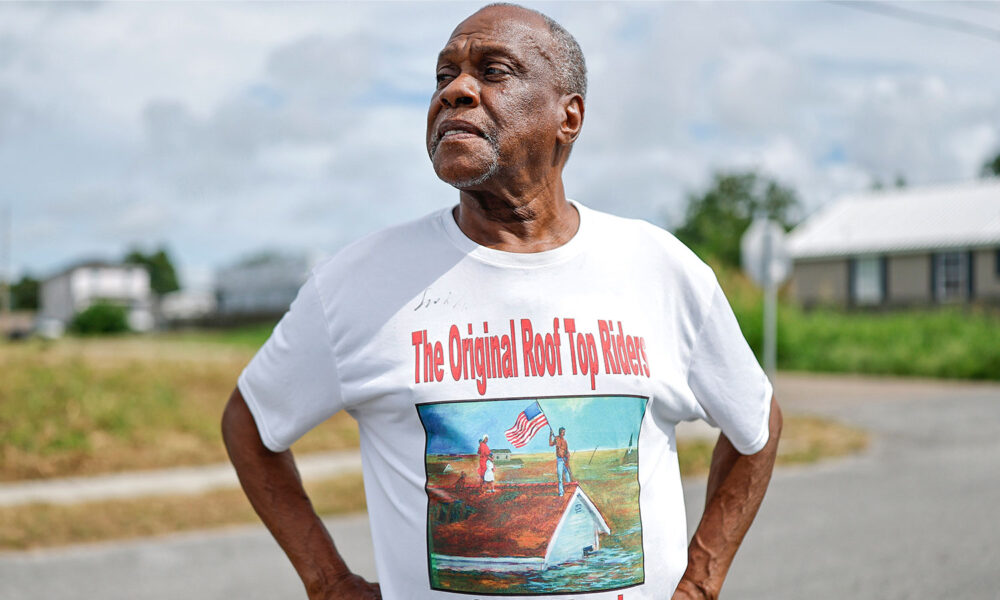August 29th marks the 20th year since Hurricane Katrina cut a wide swathe of devastation across communities along the Gulf Coast, in Louisiana, Mississippi, Alabama and Florida. For those who lived through this disaster, no reminders are needed of the deep, long-lasting harms and the harsh lessons that emerged. As a nation, we still have a long way to go in honoring the lives lost, the painful lessons learned (and unlearned), and holding our government accountable for doing better.
The cataclysmic impacts of this monster storm reverberate to this day. Nearly 1400 lives lost. Eighty percent of the city of New Orleans under water, requiring 43 days for all the floodwaters to be removed. Large areas of the Mississippi coastline completely decimated. Over $200 billion (in 2024 dollars) in damages. 1.5 million people displaced, one of the largest internal displacements of people within the United States, thousands of whom never returned to their homes. Over a million homes damaged or destroyed, leading to the largest national housing crisis since the Dust Bowl. The disproportionate impact of the storm and its aftermath on the Black population of New Orleans, which has still not recovered its pre-Katrina numbers. The terrible destruction wreaked on the United Houma Nation, hit back-to-back by Hurricanes Katrina and Rita, and cruelly overlooked by the federal government because they lack federal recognition as a Tribe.
Many local leaders and community groups are commemorating this week with events on ground. Hearing from them directly about the losses, the hard-earned lessons, their struggles to fight for their rights and build back, and their perspectives on what it will take to protect communities in the face of worsening climate change, is crucial. My colleague Zoe Middleton and I had the privilege of joining in Katrina20 events in New Orleans organized by local groups, including anchors Taproot Earth, Foundation for Louisiana, Ashé Cultural Arts Center, and Junebug Productions. Other groups leading events include the Mississippi NAACP, Housing NOLA, and the Chisholm Legacy Project.
A human-caused disaster
Katrina underscored a reality that has become undeniable in the years since:
Climate change together with long-standing racial and socioeconomic inequities are the background conditions within which communities experience extreme disasters.
We cannot design effective and equitable solutions to better protect people without recognizing these realities and the root causes behind them. Those root causes include unequal power dynamics that have led to unjust policies and institutional structures for disaster preparedness, response and recovery. And the extractive, polluting, deep-pocketed fossil fuel industry, which holds all too much sway over our politics and policymaking, is a key contributor to the health, environmental and climate impacts that communities face.
Katrina was no ordinary disaster—it was human-caused. There’s no question that our government’s actions that day—or lack thereof—directly contributed to the steep human toll. From the failure to safely evacuate and house people, to the inadequate rescue and recovery efforts, all of those failures added up to more deaths and suffering. Much has also been written about the engineering flaws that led to the failure of the levees in New Orleans, including this report from the American Society of Civil Engineers.
Hurricanes worsened by climate change
Scientists from Climate Central have estimated that Katrina’s top wind speeds of 175 miles per hour (mph) were increased 5 mph because of the energy it was able to feed off from Gulf waters that were 1.6°F warmer due to climate change. Their analysis showed that climate change made those warmer ocean temperatures 18 times more likely. And that increase in wind speed is estimated to have contributed to increasing the damages from the storm by 25%.
The rapid intensification of hurricanes, mainly due to warmer waters, has now become a hallmark of climate-fueled storms. Warmer air also holds more moisture so storms tend to carry more heavy rainfall with them. And rising sea levels mean that destructive coastal storm surges are now able to reach higher and further inland.
The fact is that in today’s climate, even more dangerously warmed since 2005, the impacts on people and property could be much worse, were a storm like Katrina to form and make landfall.
Policy lessons from Katrina—now being lost to Trump administration attacks
On the policy front, twenty years on, the question is: did we actually learn the lessons of Katrina and take necessary action to make sure we do better? Unfortunately, in many ways the answer is no. Storm after storm since Katrina—Sandy, Harvey, Maria, Helene, Milton, the list goes on—has shown that we are still falling far short of being prepared ahead of disasters, and ensuring people have the resources they need to get back on their feet after disasters strike.
In the aftermath of Katrina, there was widespread recognition—including from President Bush—that the government had utterly failed its people. Many reports were written to draw out those lessons, including one from the Bush administration and one from a bipartisan Senate oversight committee.
These reports make for haunting reading all these years later. Here is an excerpt from the Senate report for example: “…the suffering that continued in the days and weeks after the storm passed did not happen in a vacuum; instead, it continued longer than it should have because of – and was in some cases exacerbated by – the failure of government at all levels to plan, prepare for, and respond aggressively to the storm. These failures were not just conspicuous; they were pervasive.”
Congressional oversight led to legislation to reform FEMA, the Post-Katrina Reform Act of 2006, and some important progress was made over the years to improve emergency management systems.
But now the Trump administration is attacking and reversing all that progress, to the point that this week 191 FEMA staffers released a ‘Katrina declaration and petition to Congress’ to raise the alarm. (Unfortunately and predictably, the administration has retaliated by putting several of these staff on leave). Drastic cuts in seasoned professional staff and budgets, the installation of successive acting FEMA administrators (Cameron Hamilton and David Richardson) with no emergency management experience, the rollback of critical funding and programs, halting door-to-door canvassing for disasters, authoritarian decision-making by Department of Homeland Security secretary Kristi Noem—all put people at great risk.
After Katrina, scientific agencies also committed to making improvements in hurricane forecasting and communicating risk to the public. NOAA launched the Hurricane Forecast Improvement Program in 2007. In the years since, the National Hurricane Center’s ability to forecast the path of storms, their projected intensity, and landfall timing has improved tremendously. They also have greatly improved tools to predict storm surge height and extent, as well as precipitation totals. Unfortunately, the current administration is threatening a lot of that progress by its assaults on NOAA—cutting staff, budgets, scientific resources, and creating a chilling atmosphere around anything to do with climate science.
Katrina also taught us very clearly that climate justice and housing justice are inextricably connected. Yet the administration is also decimating the Department of Housing and Urban Development (HUD) and undermining its fair housing mandate.
This is, without a doubt, an especially sobering moment to be commemorating Katrina. Hard as it is to imagine, in some ways people across the nation could be at greater risk today than back then—both because the climate crisis has accelerated and because our government is taking a dangerous turn toward authoritarianism, ignoring science and ignoring the voices of frontline communities while boosting fossil fuels.

